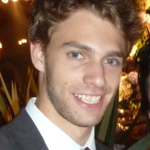Fellow Detail

| Name | Benjamin Krikler |
|---|---|
| Affiliation | University of Bristol |
| Department | Physics |
| Research area code | (F3) Physics |
| Fellowship Inauguration Year | 2019 |
| Institutional Website | https://research-information.bristol.ac.uk/en/persons/ben-e-krikler(5af90759-aecb-46f4-94c1-d505a43b5f2d).html |
| ORCID | https://orcid.org/0000-0001-9712-0030 |
| GitHub | benkrikler |
| ben-krikler | |
| Interests | Particle physicist by day, software developer by night. Although more than often its the other way, or at the same time. My current research focusses on Dark Matter, and trying to shed light on what it really is. I like developing new coding tools to simulate and analyse this data. |
| Short Biography | Particle physics is a strange subject where we create some of the world's most powerful machines and collect some of the largest experimental datasets in order to study the smallest imaginable particles in the universe. Searching for something so tiny and rare amongst all our data, needs both accurate and efficient programming tools to help us know what to expect, and understand what we have observed. My research so far has seen me work on three particle physics experiments: COMET in JAPAN, LUX-ZEPLIN in the US, and CMS at CERN, all of which are looking for experimental evidence to help us improve our understanding of how the universe was created and continues to evolve. The COMET experiment aims to measure a process called muon-to-electron conversion, which has never been seen before and would help us understand, at the very least, how neutrinos get their mass. I completed my PhD on the COMET experiment in late 2016 at Imperial College London. Nowadays, as a research associate at the University of Bristol, I search for Dark Matter, either through its production in high-energy proton collisions at the CMS experiment at the LHC at CERN, or for direct interactions between Dark Matter from space and the Earth at the LUX-ZEPLIN experiment. In the modern world, research on such topics cannot progress without strong software and I have spent a large part of my career so far writing code for these experiments. Through my fellowship with the S.S.I., I will be building on my past experience and creating new collaborations: running workshops on the use of GPU and cloud computing infrastructure; using Jupyter Notebooks as a tool for better reproducibility; and sharing techniques between particle physics, the wider research software community, and industry as a whole. |
Previous events
| Title | Start date | End date |
|---|---|---|
| Computing in High Energy Physics + pre-conference Analysis Workflow Workshop | 01 Nov 2019 | 08 Nov 2019 |
| PyHEP 2019 (Python in High Energy Physics) | 16 Oct 2019 | 18 Oct 2019 |
| SSI Collaborations Workshop 2019 (CW19) | 01 Apr 2019 | 03 Apr 2019 |
Blog Posts
| No event. |